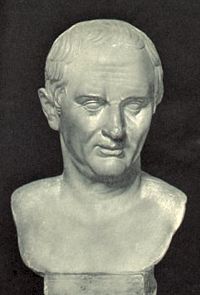 I guess Cicero was the original flip-flopper. Since following him in a recent boat of watching the HBO / BBC TV series, Rome, I’ve been reading up on the guy who before I’ve mainly known from heresay—from the pens of Augustine, Montaigne, etc. It was disappointing to see that the show had no interest in Cicero’s (or anyone else’s) life in ideas, but its depiction of him as politician still caught my eye. Though it seems that there are the inevitable historical inaccuracies (such as his role in the Senate during the rule of Julius Caesar), Rome‘s general gist of the man seems right: he was easily swayed and never convinced, and, besides the lost dream of the republic, he didn’t seem to have convictions—which is a thing people, and particularly politicians, are supposed to have.
I guess Cicero was the original flip-flopper. Since following him in a recent boat of watching the HBO / BBC TV series, Rome, I’ve been reading up on the guy who before I’ve mainly known from heresay—from the pens of Augustine, Montaigne, etc. It was disappointing to see that the show had no interest in Cicero’s (or anyone else’s) life in ideas, but its depiction of him as politician still caught my eye. Though it seems that there are the inevitable historical inaccuracies (such as his role in the Senate during the rule of Julius Caesar), Rome‘s general gist of the man seems right: he was easily swayed and never convinced, and, besides the lost dream of the republic, he didn’t seem to have convictions—which is a thing people, and particularly politicians, are supposed to have.
Cicero switched sides at a crucial moment, and in ignominy—he transferred his allegiance from Pompey to Caesar, begging forgiveness from the new emperor. He could never quite commit himself to any position.
I suspect, indeed, that Cicero’s flip-flopping cannot be understood without his philosophy—which is why he is such a strange character in the TV show. An eclectic skeptic, skeptical even of skepticism, the richness of his ideas seem to have undermined his political career.
Another case of a similar thing arises in a passage from Michael Novak’s forthcoming book about New Atheists, which I am currently in the process of reviewing:
In times of stress, distinguished intellectuals such as Heidegger and various precursors of postmodernism (including deconstructionist Paul de Man) displayed a shameless adaptation either to Nazi or to Communist imperatives—or to any other anti-Hebraic relativism. Even elites may lose their moral compass. (No One Sees God, p. 53)
It is a terrifying thing in Cicero and in folks like Heidegger, something I can only call a sin, and yet a sin I want so much to transform into a workable virtue.
No great conclusions from me tonight. These examples touch on issues that I’ve been toying with a lot lately: The Politics of Cowardice | Different Sorts of Skepticism | Becoming a Person — and so on. The problem is this: how does a person keep an open mind and see truth in different sides while remaining a coherent person, and more, a fighter for good?